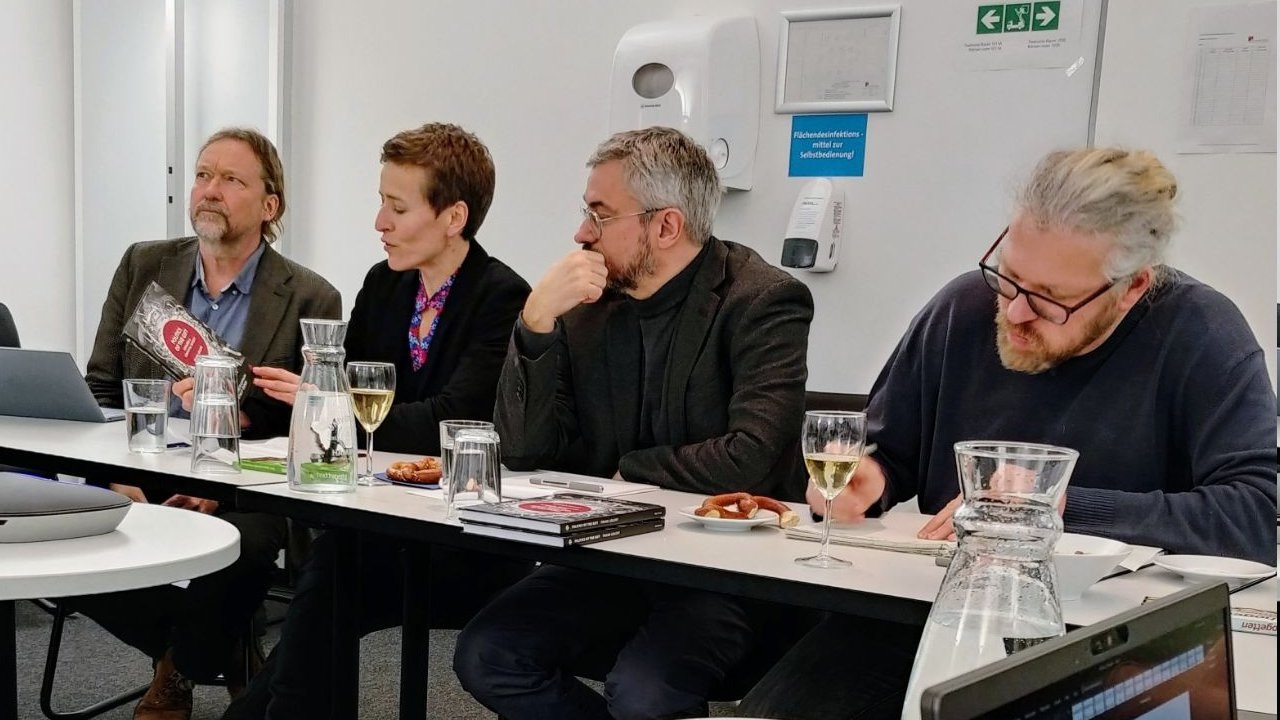Normal
0
21
false
false
false
DE
X-NONE
X-NONE
/* Style Definitions */
table.MsoNormalTable
{mso-style-name:"Normale Tabelle";
mso-tstyle-rowband-size:0;
mso-tstyle-colband-size:0;
mso-style-noshow:yes;
mso-style-priority:99;
mso-style-parent:"";
mso-padding-alt:0cm 5.4pt 0cm 5.4pt;
mso-para-margin-top:0cm;
mso-para-margin-right:0cm;
mso-para-margin-bottom:8.0pt;
mso-para-margin-left:0cm;
line-height:107%;
mso-pagination:widow-orphan;
font-size:11.0pt;
font-family:"Calibri",sans-serif;
mso-ascii-font-family:Calibri;
mso-ascii-theme-font:minor-latin;
mso-hansi-font-family:Calibri;
mso-hansi-theme-font:minor-latin;
mso-bidi-font-family:"Times New Roman";
mso-bidi-theme-font:minor-bidi;
mso-font-kerning:1.0pt;
mso-ligatures:standardcontextual;
mso-fareast-language:EN-US;}
"Politics of the Gift":
A Convivial Evening
In fall 2022, the English translation of Frank Adloff’s 2018 book “Politik der Gabe” was published with a new preface by Bristol University Press as “Politics of the Gift: Towards a Convivial Society.” The book is part of the series “Alternatives to Capitalism in the 21st Century” edited by Lara Monticelli and Torsten Geelan. The Humanities Centre for Advanced Studies “Futures of Sustainability” invited to a book launch and a convivial evening on 15 Feb 2023 in Hamburg. It was attended by around 50 people, some of them via Zoom.

The event was moderated by Christine Hentschel (University of Hamburg), who highlighted the book’s focus on anthropology and pointed out the universal anthropological significance of conviviality. Lara Monticelli (Copenhagen Business School), series editor of “Alternatives to Capitalism in the 21st Century,” joined via Zoom and praised the book as an incredibly important contribution: Although politics of gift-giving is not so much debated in mainstream discourse, it provides important insights into the conditions of of coexistence. Moreover, the book illuminates alternatives to capitalism and gives insights into how capitalism works, Monticelli said.
Adloff elaborated that the prominence of the gift in his work is due to the fact that his most important intention was to shed light on the conditions of possibility of convivial behavior. He is, as he stated, strongly influenced by Alain Caillé, the spiritus rector of convivialism (who attended the event via Zoom), and his gift paradigm, which he develops based on Mauss. From here he takes the insight that care and benevolence are based on giving, not only taking – as neoclassical and utilitarian approaches claim. Adloff also took up findings of psychology and evolutionary biology that human beings are ultra-social. It is his observation that conviviality is only partly realized in current societies. He sees it as the task of sociology to work on this realization. For this Adloff offers, as he said, a different approach to Habermas, who sees the opposition to instrumental action in language. Adloff’s shift is to focus on cooperation instead of language) (relying on Dewey and others). For changing societies towards convivialism, reforms are necessary that rely on coalitions between activists and states and some corporate actors.
Adloff also sees the concept of the gift as helpful in the relationship with nature. In older societies, according to Adloff, there is a tradition of gift relationships and reciprocity between human beings and non-human beings or entities that was suppressed during the last 500 years. But partnership towards nature is not completely lost and could be revitalized. Adloff’s main diagnosis is that neoliberal institution-building is assembled around self-interest. The questions in terms of politics are: How do people want to live together and how to achieve these visions.
When asked by Hentschel about a possible coming collapse (social, economic, environmental), Adloff replied: only a convivial society could prevent such catastrophes and even if the collapse would not be avoidable, a convivial society would guarantee a higher level of resilience during a catastrophe.
Andrew Stirling (University of Sussex Business) and Matthias Thiemann (SciencesPo) gave co-lectures in which they spoke favorably of Adloff’s book. Stirling praised it as a “very scholarly book, engagingly written, politically inspiring.” Thiemann called it a “deep and dense book, an extra-ordinary gift.”
In the spirit of convivial debate, however, Stirling, Thiemann, Hentschel, and other participants also posed some critical questions. Discussion unfolded especially around the “dark sides of the gift” and its affective logic. If the gift is built on trust, what about other affects like frustration, anger, etc.? Adloff stated that gratitude, self-esteem, and mutual recognition are important in regard to the gift. If not acknowledged, a negative cycle driven by revenge can occur. A positive cycle can tip. It is important to realize that the gift is not a thing, the gift relationship is a relationship – as especially Stirling pointed out. The receiver defines what is a gift, not the giver. If the receiver does not understand that what is given is a gift, it is not a gift. Thiemann pointed out that it is important to develop a concept of global transformation: In terms of international relations, Adloff argued, relying on Mauss and Keynes, debt cancellation between states is needed. Someone – the powerful states – must start. This leads to building up of trust. Also states in the North must understand they depend on the global South. Here, too, Mauss is instructive: in his unfinished book on the nation, he shows that states are already de facto dependent on each other. It is vital to acknowledge that we depend on others.
After the plenary discussion, the event offered space for informal exchange over wine and snacks.

